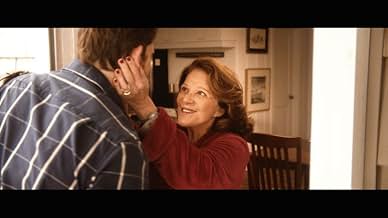A comedy from an original script by Michael Maren, about a failed Brooklyn writer, Nathan Fisher, played by Bryan Greenberg, who visits his ailing parents in Florida. His mother (Lavin) has ... Read allA comedy from an original script by Michael Maren, about a failed Brooklyn writer, Nathan Fisher, played by Bryan Greenberg, who visits his ailing parents in Florida. His mother (Lavin) has Alzheimer's and his father (Yulin) has recently had a stroke.A comedy from an original script by Michael Maren, about a failed Brooklyn writer, Nathan Fisher, played by Bryan Greenberg, who visits his ailing parents in Florida. His mother (Lavin) has Alzheimer's and his father (Yulin) has recently had a stroke.
- Awards
- 1 win total
- Director
- Writer
- All cast & crew
- Production, box office & more at IMDbPro
Featured reviews
The theme of aging parents, Alzheimers and other diseases has been literally done to death. This movie wastes a lot of opportunities to be different but just seems to wither away midway through the film....and ultimately die. It makes one wonder was what the point of rehashing this theme yet again! To put it simply.....it just doesn't work!
I thoroughly enjoyed this film. The actors are excellent and inhabited their characters plausibly. Harris Yulin, the father, is pitch perfect. Linda Lavin, the mother, is good but not great. My highest praise though, is for Michael Maren for writing a good story with genuine characters and pitch perfect dialogue, no tricks, and for directing in a smooth, well paced and confident style. The turning points are organic and not contrived; if we see them coming it's because we have thoroughly bought into the story and empathize with the characters, and the story goes where we would take it. It's not easy to make such a touching film without being saccharine -- Maren succeeds with grace. This is a really good film.
I really enjoyed the tempo and pacing of this movie. Felt like a dance all the way through. Parents and kids revealing bits of themselves to each other, then pulling back, then being vulnerable, then teasing. All with a rhythm that felt natural to me. Not all that familiar in terms of my own family, but recognizably real. Yes, the parents are disappointed in their kids -- and they have a right to be -- but that's life. And they still love them. Yes, the parents are in the last chapter of their lives, and they know it, and they're dealing with it the best they can. One false note all the way through was the number of beautiful women available to the younger son. Oh well. It's a movie and that pays for the tickets, I know. Overall, a well told story I will recommend to family and friends.
I enjoy much of how the story flow has been set. Maybe it is not as fun and hillarious as "500 summer" - It's not that kind either. But, personally I can feel the emotion that been delivered - by each actors and actress. It's just.. enjoyable and worth to watch, even twice - at least by myself as an audience.
Small films like small books depend on one or two core elements to get it right because there's neither room nor budget for more. Writers make decisions. Producers make more decisions, and everything's in service to getting it done, getting it on the page, putting it up on the screen, and then hoping like hell the whole is greater than the sum of the parts.
The usual term for such works is intimate, but usually what's meant by that is "personal." Personal films, though, are often in-your- face dramatic (or comedic) pieces depending in shock, or arcana or attitude to interest the viewer. If one intends intimate, then a lot of meaning and insight will be between the lines. Intimacy is rarely explicit, but rather reflected in the immediate comprehension of what's signified but not spoken. Often there's not much explosion, if any (though there will be dramatic pivot points). Michael Maren's film "A Short History of Decay" is a small, intimate film wholly dependent upon the relationships between the four main characters, a procrastinating ne'er-do-well younger brother (Bryan Greenberg), his older, more successful brother (Benjamin King), and their ailing parents,, a father (Harris Yulin) stricken by stroke but still competent, and a mother (Linda Lavin) disappearing into the wispy vapors of dementia (Alzheimer's) to drive the film.
Indeed, the plot, as little as there is of it, is absurdly simple. The father suffers a stroke, and the two brothers end up in Florida trying to cope with what's an impossible situation: their father's rapidly declining health and their mother's descent into dementia "We're losing," the father says. He's right. The two sons hang out for a while. Small changes occur, but at the end of the film, Big brother goes back to his family, and Little brother stays on. That's it. If you're looking for special effects and loud noises, this is not that film.
"Decay," though, is worth whatever effort one has to exert to see it. The actors feast on Michael Maren's words, their characters plumping and prospering as Maren's dialogue lights up the complex connections, letting the audience understand changes which are percolating even as the characters in the film don't yet have a clue about it. Ultimately, at least in my view, it's the brothers who are central, the absolute one core element that has to work or the film falls to pieces.
It works. In spades. The two brothers contain everything about the family worth understanding. I suspect Lavin and Yulin as the parents will garner the most attention, but watch Greenberg and King go to work here. The brothers are the product of their parents' lives, and each is facing a difficult stretch that strains the static way they'd previously the family as a unit, and their own place in the cosmos. The dialogue sings of underlying affection salted with genuine anger, bitterness and jealousy, yet leavened by commitment to their parents. Filmgoers won't get many chances in their lifetime to see relationships as beautifully drawn as this. It's worth the price of admission alone. I've no idea how this film will percolate out into theaters elsewhere, but right now it's at The Village East Cinema in New York City, 189 2nd avenue (11th & 12th streets).
The usual term for such works is intimate, but usually what's meant by that is "personal." Personal films, though, are often in-your- face dramatic (or comedic) pieces depending in shock, or arcana or attitude to interest the viewer. If one intends intimate, then a lot of meaning and insight will be between the lines. Intimacy is rarely explicit, but rather reflected in the immediate comprehension of what's signified but not spoken. Often there's not much explosion, if any (though there will be dramatic pivot points). Michael Maren's film "A Short History of Decay" is a small, intimate film wholly dependent upon the relationships between the four main characters, a procrastinating ne'er-do-well younger brother (Bryan Greenberg), his older, more successful brother (Benjamin King), and their ailing parents,, a father (Harris Yulin) stricken by stroke but still competent, and a mother (Linda Lavin) disappearing into the wispy vapors of dementia (Alzheimer's) to drive the film.
Indeed, the plot, as little as there is of it, is absurdly simple. The father suffers a stroke, and the two brothers end up in Florida trying to cope with what's an impossible situation: their father's rapidly declining health and their mother's descent into dementia "We're losing," the father says. He's right. The two sons hang out for a while. Small changes occur, but at the end of the film, Big brother goes back to his family, and Little brother stays on. That's it. If you're looking for special effects and loud noises, this is not that film.
"Decay," though, is worth whatever effort one has to exert to see it. The actors feast on Michael Maren's words, their characters plumping and prospering as Maren's dialogue lights up the complex connections, letting the audience understand changes which are percolating even as the characters in the film don't yet have a clue about it. Ultimately, at least in my view, it's the brothers who are central, the absolute one core element that has to work or the film falls to pieces.
It works. In spades. The two brothers contain everything about the family worth understanding. I suspect Lavin and Yulin as the parents will garner the most attention, but watch Greenberg and King go to work here. The brothers are the product of their parents' lives, and each is facing a difficult stretch that strains the static way they'd previously the family as a unit, and their own place in the cosmos. The dialogue sings of underlying affection salted with genuine anger, bitterness and jealousy, yet leavened by commitment to their parents. Filmgoers won't get many chances in their lifetime to see relationships as beautifully drawn as this. It's worth the price of admission alone. I've no idea how this film will percolate out into theaters elsewhere, but right now it's at The Village East Cinema in New York City, 189 2nd avenue (11th & 12th streets).
Did you know
- TriviaHarris Yulin and Linda Lavin have played husband and wife before, in The Diary of Anne Frank on Broadway, playing Mr. and Mrs. Van Daan, for which Ms. Lavin received a TONY nomination.
Details
- Release date
- Country of origin
- Official sites
- Language
- Also known as
- A Short History of Decay
- Filming locations
- Production companies
- See more company credits at IMDbPro
Box office
- Budget
- $750,000 (estimated)
- Runtime1 hour 34 minutes
- Color
- Aspect ratio
- 2.35 : 1
Contribute to this page
Suggest an edit or add missing content

























